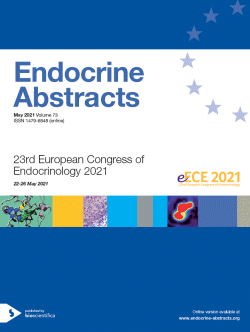
European Congress of Endocrinology 2021
Online
22 May 2021 - 26 May 2021
Presented Eposters
Presented ePosters 14: COVID-19
ea0073pep14.1 | Presented ePosters 14: COVID-19 | ECE2021
Is initial hypocalcemia related to poorer outcomes in COVID-19 patients?
Alves Helena , Ferreira Marta Almeida , Almeida Lucia , Correia Sara , Ramalho Diogo , João Oliveira Maria
ea0073pep14.2 | Presented ePosters 14: COVID-19 | ECE2021
Selenium, zinc, and vitamin D supplementation affect the clinical course of COVID-19 infection in Hashimoto’s thyroiditis
Velija Asimi Zelija , Hadzovic-DzuvAlmira , Al Tawil Djinan
ea0073pep14.3 | Presented ePosters 14: COVID-19 | ECE2021
Multi-omics approach to analyze the molecular pato-physiology of the low T3 syndrome, observed in COVID-19 patients
Sciacchitano Salvatore , Vitis Claudia De , D’Ascanio Michela , Petrucca Andrea , Salerno Gerardo , Amodeo Rachele , Sacconi Andrea , Salvati Valentina , Piaggio Giulia , Latouliere Luisa de , Ricci Alberto , Mancini Rita
ea0073pep14.4 | Presented ePosters 14: COVID-19 | ECE2021
SARS‑CoV‑2: potential trigger for a cerebral venous thrombosis associated to subacute de Quervain’s thyroiditis?
Juan-Antonio Ruiz-Gines , MIGUEL-ANGEL RUIZ-GINES , Maria-Piedad Picazo-Perea , Patricia Fuentes-Bullejos , David Melguizo-Melguizo , Maria-Carmen Lorenzo-Lozano
ea0073pep14.5 | Presented ePosters 14: COVID-19 | ECE2021
Macro-TSH as a cause of refractory hypothyroidism in a covid-19 patient: description of the first case
Miguel-Angel Ruiz-Gines , Maria-Piedad Picazo-Perea , Juan-Antonio Ruiz-Gines , Sastre Julia , Mercedes Agudo-Macazaga , Esther Martin-Torres , Aurora Lopez-Martos , Maria-Carmen Lorenzo-Lozano
ea0073pep14.6 | Presented ePosters 14: COVID-19 | ECE2021
Higher incidence of COVID-19 in patients with adrenal insufficiency compared with background statistics
Yedinak Christine , Louis Ross Ian
ea0073pep14.7 | Presented ePosters 14: COVID-19 | ECE2021
Psychological distress in patients with hypocortisolism during mass quarantine for Covid-19 epidemic in Italy
Simeoli Chiara , Barbot Mattia , Franco Marta , Martino Marianna , Morelli Valentina , Ferraù Francesco , Paragliola Rosa Maria , Hasenmajer Valeria , Guarnotta Valentina , Filpo Giuseppina De , Giordano Roberta , Dalmazi Guido Di , Sabbadin Chiara , Veresani Alessandro , Isidori Andrea M. , Mantovani Giovanna , Arnaldi Giorgio , Boschetti Mara , Scaroni Carla , Colao Annamaria , Iasevoli Felice , Pivonello Rosario
ea0073pep14.8 | Presented ePosters 14: COVID-19 | ECE2021
Simulation via Instant Messaging – Birmingham Advance (SIMBA) model helps improve clinicians’ confidence to manage various endocrine conditions during the COVID-19 pandemic
Warmington Emily , Morgan Georgia , Ooi Emma , Hanania Thia , Davitadze Meri , Zhou Dengyi , Blaggan Parisha , Ng Cai Ying , Allison Isabel , Chen Wentin , Thomas Lucretia , Evans Nia , Arlt Wiebke , Boelaert Kristien , Cooney Rachel , Pathmakanthan Shri , Reddy-Kolanu Vinay , Karavitaki Niki , Tait Karen , Narendran Parth , Melson Eka , Kempegowda Punith



